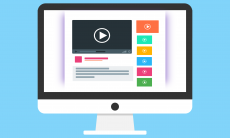The other day, I had the chance to meet with Rich Herbst, founder and managing partner of Ascend Marketing, which is based in Dallas and Austin. Rich agreed to discuss what he and his team have been doing in B2B, and share what they’ve learned in recent years, as business buying behavior evolves. His team has developed a breakthrough approach to delivering a custom communications stream to business buyers based on their particular journeys. Very cool stuff. My gratitude to him for providing these insights.
Q: Tell us a bit about your professional background, Rich.
When I was working on my MBA years ago, I had in mind a career in strategic marketing, but with some sort of entrepreneurial slant. I started my career in CPG, which I really enjoyed, and then transitioned into telecom/tech. During my corporate career, I somehow found my way into a series of transformational challenges, like brand relaunches and new product work – which was really invigorating. We started Ascend Marketing in 2004, and it’s been a fun and interesting ride.
Q: How is Ascend differentiating from its competitors?
We work in a model quite different from traditional agencies or consultancies. Our specialty is Journey Marketing – particularly highly automated journeys – and it requires a different approach. We work very deeply with our clients to transform their marketing, from the ”inside out,” so to speak. It requires a rethink of a whole lot of marketing, sales, and business processes. It’s more than just changing campaign tactics or finding a new agency. We help clients envision – and then deliver – more powerful customer and prospect journey experiences across their full life cycle and across all channels, using advanced data and automation technology.
Q: You and your Verizon client recently won a silver PRO Award from Chief Marketer. Congrats! What was that campaign, and what can marketers learn from its success?
That was Verizon’s Quantum Upgrade program. It was more than just a campaign. It’s actually a great example of the highly advanced – and automated – customer journey approach I mentioned.
Verizon was looking for a better way to upgrade its business customers to a faster Internet speed. They also had a vision of applying more advanced automation and data technology. We began in 2016 by designing a more sophisticated journey architecture. Using the Kitewheel decisioning engine, plus a custom data platform, we created personalized experiences for each marketing communication recipient.
Each Verizon business customer received a personalized email with a unique subject line, headline, subhead, marquee header image, body copy, Verizon phone number, landing page, offer, price point, legal disclaimer, and call-to-action button. By segmenting customer data and continuously testing subject lines, body copy and creative, our custom-designed journey marketing platform automatically served emails with best-performing subject lines, creative and offers to each qualified customer. Ascend also designed custom landing pages that matched each email version.
The results were astounding. The email open rates more than doubled. The volume of inbound calls increased by 7%. Cost per acquisition went down 14%. Best of all, sales increased by 336%.
Q: Why do you think journey-specific marketing is the way to go in B2B marketing?
We think the journey approach is what’s next in marketing. Rather than blasting messages at targets, we are gaining direct insight into what the customer or prospect is really seeking, in that moment, and where the prospect is in an overall life cycle. Based on those insights, we deliver a highly attuned experience that meets them where they are. When we do that well, the results soar.
Perhaps the most significant aspect of this work is interpreting, via the available data, the signals that tell us where the customer is in his/her journey. While there’s a lot of automation being used in B2B marketing today, mostly we still see marketers using technology to basically pull a list and then deliver an automated series of digital tactics.
Automated Journey Marketing goes far beyond just pulling a list. And the delivery of that experience should go well beyond the basic digital channels to incorporate sales channel experiences, personalized web experiences, and service experiences.
Q: What advice would you give to a B2B company that wants to start a customer journey marketing program?
Take a step-wise approach. First, it’s critical to put a sound roadmap in front of the work. Second, journey automation strategies involve real rigor in data handling. You have to align data from a number of sources and channels, and the data must be clean for the journey experiences to execute reliably.
Third, content management can be overwhelming if not taken in steps. To design and deliver well-attuned journey experiences, you need to assemble the relevant content. Plus, you need more refined versioning of the creative to make sure each touchpoint matches the customer’s needs and preferences.
With those foundational pieces in place, the automation work is more likely to succeed.
Q: Things are changing so fast these days. Where do you see future opportunity for B2B marketers?
I think that B2B marketers who can strategically get their arms around the advanced insights and tech tools available today will be able to write their own tickets.






